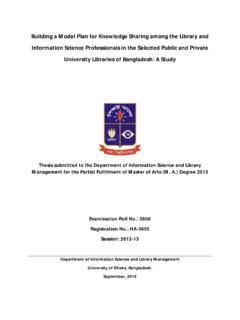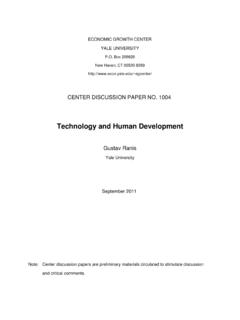Transcription of Impact of Information Technology and Role of Libraries in ...
1 28 International CALIBER-2008. Impact of Information Technology and Role of Libraries in the Age of Information and Knowledge Societies D K Singh Mohammad Nazim Abstract Information Technology is currently taking center stage and transformed the whole world into a global village with a global economy, which is increasingly dependant on the creative management and distribution of Information . The enormous advantages it has in easing the delivery of Information around the world. The paper discusses the Impact of Information Technology and role of Libraries in the age of knowledge and Information societies. It also highlights the problems faced by the Library & Information Service (LIS) sector in India and achievements over the years using modern Information technologies. Keywords : ICT, Information Technology , Library Services, Knowledge Management 1. Introduction Information Technology has transformed the whole world into a global village with a global economy, which is increasingly dependant on the creative management and distribution of Information .
2 Over the past decades the world has been experiencing significant changes in which the need to acquire, utilize and share knowledge has become increasingly essential. Now, in the 21st century, the age of knowledge and Information is in its higher gear. This is an age when invisible knowledge and Information take the role of prime movers leading all sector (1). The World Bank has used metaphor knowledge is development . Lack of knowledge is largely responsible for underdevelopment (2). In a knowledge and Information -oriented society, creative brains become leaders of economy and knowledge workers are in great demand. If knowledge can be equated with development, then the wider the knowledge gap, the broader the development gap. Emergence of Information and Knowledge Societies Some 10,000 year ago the early ancestor of mankind, subsisted by hunting and gathering, started to building agrarian societies. The old agrarian societies began their transitions to industrial societies in mid-18th centuries (3).
3 Expansion of intellectual activities in industrial societies, such as industrial production, international trade and transactions, and technological advancement , stimulated mass distribution of education and creation of Libraries . Industrial societies continued their enormous material development throughout the 20th century. The Information society has passed through four transformational stages of development, the most radical stage starting at the tail end of the 20th century. This stage has brought a never-ending revolution, particularly with the introduction of Information and communication technologies (4). During this period, there have been unprecedented developments, profoundly affecting the social 6th International CALIBER-2008, University of Allahabad, Allahabad, February 28-29 & March1, 2008 INFLIBNET Centre, Ahmedabad 29. structure the decline of manufacturing sector as compared to the prospering Information -rich service sector is one example of such developments (5).
4 The concept of knowledge societies is often used to denote a development in or second generation of Information society. Whereas the Information society aims to make Information available and provide the necessary Technology , the knowledge society aims to generate knowledge, create culture of sharing and develop applications that operate mainly via the Internet (6). The goal of knowledge society is to fill social needs, create wealth and enhance the quality of life in a sustainable manner. India is moving fast towards becoming an Information society as the Government of India is paying due attention to the use of Information Technology (IT). The Prime Minister of India constituted a National Task Force on IT and Software Development in May 1998 with the purpose of formulating a long-term National IT Policy to convert India into an IT software superpower. These steps are helping India to shift from an economy of goods to a knowledge economy or knowledge driven economy.
5 The beginning of the knowledge society has been made through creation of parks and corridors, and the Prime Minister has given a mission of converting India into a knowledge society . by the year 2008. Today, India is one of the largest exporters of knowledge workers (7). 2. Role of Libraries In the modern knowledge society Libraries have a new role and there are various types of library models. In the modern society, where the use of electronic services and Web-based Information sources constantly increases, Libraries are managed in a more democratic way, have more flexible communication system and work organization, and their service development is based on the quality and user-orientation of services. In the modern knowledge society Libraries have a new role and there are various types of library models. These are as follows: traditional library as a memory institution library as a learning and research centre library as a cultural and communication centre electronic library digital library virtual library as library without walls Libraries had been performed many important roles in the past agrarian and industrial societies.
6 But those roles were limited in scope. In the 21st century, Libraries have to perform pivotal roles in disseminating and sharing the culture of knowledge. In this age of knowledge Libraries should be repositories of all of the knowledge and Information accumulated by human kind. They will have to store all kinds and forms of material and Information and disseminate beyond the geographical boundaries. Today's advanced Information Technology is enabling Libraries to accomplish this immense task. 30. Exchange of knowledge has always been the most important objectives of Libraries . Various systems have been developed to share and exchange the records of human knowledge. Universal Bibliographic Control and Universal Availability of Publications are two major programs of IFLA (International Federation of Library Associations and Institutions) to exchange knowledge world over. OCLC is the world leading library network in USA for sharing intellectual knowledge among academic community in all over the world.
7 But Libraries in the 21st century should fulfill more dynamic role. They should exchange knowledge and Information with users inside and outside their country, thus going beyond their traditional reference and lending services. This would possible when Libraries agreed to expand their roles beyond the geographical boundaries by using sate of art technologies. The modern Libraries certainly can not be passive repository for books and other printed materials. The opposite requirements of storing increasing collection in various forms and of maintaining easy access to most part of it can only be balanced by deploying Information and communication technologies. Libraries should upgrade their services by digitizing their resources for online use. These services should be accessible to anyone, regardless of time or location, through digital communication devices. Libraries can play significant role in providing a good education and knowledge of high quality. Individuals around the world, no matter how poor they may be, can access whatever knowledge and Information they need by visiting Libraries via the internet, such as the library of congress.
8 3. Problems and Opportunities Facing Libraries in India Library and Information services are fundamental to the goals of creating, disseminating, optimally utilizing and preserving knowledge. They are instrumental in transforming an unequal society into an egalitarian, progressive knowledge-based society. It is well known that in India most of the Libraries function in the government sector. These are in academic and research institutions and under the public library system, which is again under the state and central governments. At present, education being a state subject and coming under the purview of different apex agencies, there is no common direction or coordination among them. It is imperative that all Libraries (public, academic, research and special) change gear and develop at an accelerated pace. Developments in Information communication Technology (ICT) have enabled Libraries to provide access to all, and also bridge the gap between the local, the national and the global.
9 Yet the Library and Information Services (LIS). sector in India has not kept pace with the paradigmatic changes taking place in society. There are a few Libraries which are using state of art technologies to disseminate knowledge to their respective user community. There is lack of cooperation among the Libraries of different organizations and which cause the lack of union catalogues at national level. The national library failed even to do this immense task. One of the major problems faced by LIS sector in India is lack of bibliographic control at national level which causes duplication in research. A considerable number of Libraries had not been developed bibliographic databases of their documents for putting them on network. 31. To summarize, the major constraints faced by the Libraries which militate against effective dissemination and use of Information are: A considerable percentage of the population is illiterate or functionally literate making Libraries of minimal use to them.
10 Poor resource allocation for infrastructure improvement and collection development for public Libraries . Lack of sufficient sanctioned posts, forcing most services to be operated by voluntary non- professional staff, which damages Information organization and services. Lack of national policies promoting ICT as a tool for development of library systems and services. Lack of adequate trained manpower in the use of IT. Lack of funds for acquiring necessary hardware and software facilities. Resistance on the part of library staff to change from their traditional practices to the use of IT. Despite the above problems, Library and Information Services (LIS) sector in India has got remarkable achievements. Efforts had been made to set up networks at local, regional and national level to deploy Information and communication technologies and to build electronic Information sources. Besides INFLIBNET at the national level to support university and college Libraries , a number of other national networks and various library networks have also been developed including NICNET.

















